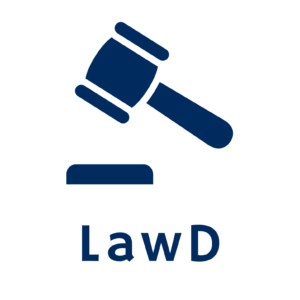By Elizabeth (Liz) Herron-Sweet – Law Division Administrator
The Law Division was very pleased to welcome Professor Yi Song of Georgetown Law School as our Distinguished Speaker at ATA64 in Miami.
Professor Song presented two sessions, “Legal Translation and Interpretation in International Litigation” and “Legal Translation in Cross-Border Transactions.”
Translation and Interpreting in International Litigation
In her first session, “Legal Translation and Interpretation in International Litigation,” Professor Song went over some background about classifications of court interpreters and who has the right to an interpreter in the U.S. She discussed some best practices of what parts of a proceeding should be interpreted and that interpreters should avoid explaining what was said or having side conversations with witnesses.
She talked about the challenging situation when a witness has some proficiency in English but is not fully fluent. She noted a specific case where a witness claimed to need an interpreter but then, after getting agitated during the proceedings, he started answering the questions without waiting for the interpretation, so the opposing counsel objected to the use of an interpreter. In these cases, best practice is for the witness to testify in English to the extent possible, and an interpreter will stand by to assist with interpretation. She described another case in which a juror who understood Spanish objected to the interpreter’s translation of a term and was ultimately dismissed from the jury because the jurors were supposed to be considering the official interpretation and not the Spanish the witness was speaking. (The interpreter was confirmed to be correct in their interpretation of the term in question.)
Professor Song also talked about “check” interpreters, who monitor the official interpretation and offer corrections. The use of a check interpreter can be requested by one of the parties and is allowed by some courts. If the official interpreter and the check interpreter disagree and cannot reconcile the translation on the record, they should note the objection and then move on. If you are a check interpreter, you need to raise your question immediately, as a delayed response can result in waiving the right to object.
Then, Professor Song explained what “leading questions” are in witness examination — questions that point out the desired answer – and how they may be used intentionally by counsel in certain cases. Even if it sounds strange, the interpreter should interpret exactly how the question was asked and not make the leading questions “systematically less leading.” For example, the leading question, “You reported the incident, did you not?” should not be interpreted as “Did you report the incident?”
Professor Song also talked about the challenges of interpreting with cultural nuances, as people from different cultures may use eye contact, facial expression, tone, and indirect communication quite differently, which can influence how a witness is understood by the jury. For instance, in personal injury cases, people who suffer an injury may be less likely to vocally complain about the suffering due to cultural norms, and the jury may consider the lack of complaints to be a measure of the extent of the injury. Of course, the interpreter can then only translate what was said in court, even if they understand some of the cultural nuances behind the witness’s behavior. In some other scenarios, such as business negotiations, interpreters are more likely to act as cultural facilitators and intermediaries between parties.
Finally, Professor Song gave some best practices for interpretation in international litigation.
- The slides for this presentation are available here: ATA 64 – Legal Translation and Interpretation in International Litigation.
Legal Translation in Cross-Border Transactions
In her second session, “Legal Translation in Cross-Border Transactions,” Professor Song started by noting that English is the language of cross-border transactions, and there is a growing demand for translators in these types of transactions. As a Chinese and U.S. lawyer working for a U.S. law firm, Professor Song found it hard to strike the right balance with Chinese clients of her U.S. firm – they didn’t like when she spoke Chinese with them because they wanted to work with “American lawyers,” but they criticized her for not remembering how to speak Chinese when she spoke to them in English!
Professor Song then went over types of cross-border transactions, the stages of a transaction, and what types of documents are involved in each stage. She pointed out that mistranslation in these transactions can lead to financial and legal risks and described a few examples where a possible mistranslation had major stakes.
Example 1 (Quoting from Professor Song’s PowerPoint presentation): “Sharp, the Japanese electronics giant, warned shareholders in a statement about its own negative cash flow. While the original Japanese statement asserted confidence in the company’s future despite the liquidity issue, the English version of the statement declared that the company’s management held “material doubt” about its future as a going concern. The corrected statement, issued a few days later, made it clear that the company had “no uncertainties” about its ability to continue. Unfortunately, the damage was already done. Sharp’s stock fell by 10% after the mistranslated statement was released.” See a Wall Street Journal article on this incident here.
Example 2: When a Chinese real estate development company was negotiating a joint venture agreement with a U.S.-based institutional investor, there was a breakdown in communication between the investor and the Chinese company due to a misunderstanding in how to interpret a question about the company’s “affiliates.” There was a significant legal difference between “affiliate” and “subsidiary” in this case, and decisions had to be made about how exactly to define each term and which country’s definition should prevail. Ultimately, how the term was defined and translated (and consequently how the question was answered) would have significant implications for finalizing the transaction.
Example 3 (Quoting from Professor Song’s PowerPoint): “International Center for Settlement of Investment Disputes (ICSID) ruled in Occidental Petroleum Corporation v. Ecuador that Ecuador [must pay] OPC $1.76 billion in damages ($2.3 billion with interest applied), the largest award ever issued by ICSID. Counsel for Ecuador believed that the award would have been significantly lower, had the tribunal had access to a better translation of key documents… The document in question mistranslated ‘solemnidad’ as ‘solemnities or legal requirements.’ The mistranslation mixed up solemnities and requirements, thus it mixed up the legal consequences of nullity vs. inexistence [of a contract].”
When talking about the role of a translator or interpreter in these transactions, Professor Song emphasized how issue spotting is a key role. She said the best practice would be to have a pre-meeting with translators and interpreters in the room to go over key terms and questions and create a glossary for legal and linguistic purposes. She also said translators should ask for reference materials whenever possible, such as corporate structure, organizational chart, list of attendees, legal document templates, and official translations or texts (disclosure), relevant laws or regulations, legal precedents. She also suggested maintaining open lines of communication with legal counsel throughout the course of the negotiation and addressing translation issues that may arise during breaks in the negotiations.
- The slides for this presentation are available here: ATA 64 – Legal Translation in Cross-Border Transactions
About the Author
 Elizabeth Herron-Sweet is a translator and interpreter with ATA certification for Portuguese into English translation. She is originally from San Diego and has a B.A. in International Studies with a concentration in Portuguese from Middlebury College. She worked as a corporate paralegal at an international law firm for six years in New York and São Paulo, focusing primarily on capital markets, M&A and FCPA compliance. She is now a translator and interpreter based in New York City and specializing in legal, business and academic translations. She has a certificate in English to Portuguese translation from New York University and a certificate in Basic Training in Conference Interpreting from Versão Brasileira in Curitiba.
Elizabeth Herron-Sweet is a translator and interpreter with ATA certification for Portuguese into English translation. She is originally from San Diego and has a B.A. in International Studies with a concentration in Portuguese from Middlebury College. She worked as a corporate paralegal at an international law firm for six years in New York and São Paulo, focusing primarily on capital markets, M&A and FCPA compliance. She is now a translator and interpreter based in New York City and specializing in legal, business and academic translations. She has a certificate in English to Portuguese translation from New York University and a certificate in Basic Training in Conference Interpreting from Versão Brasileira in Curitiba.
Get in touch: eherronsweet@gmail.com

Great summary, Liz! Thank you.